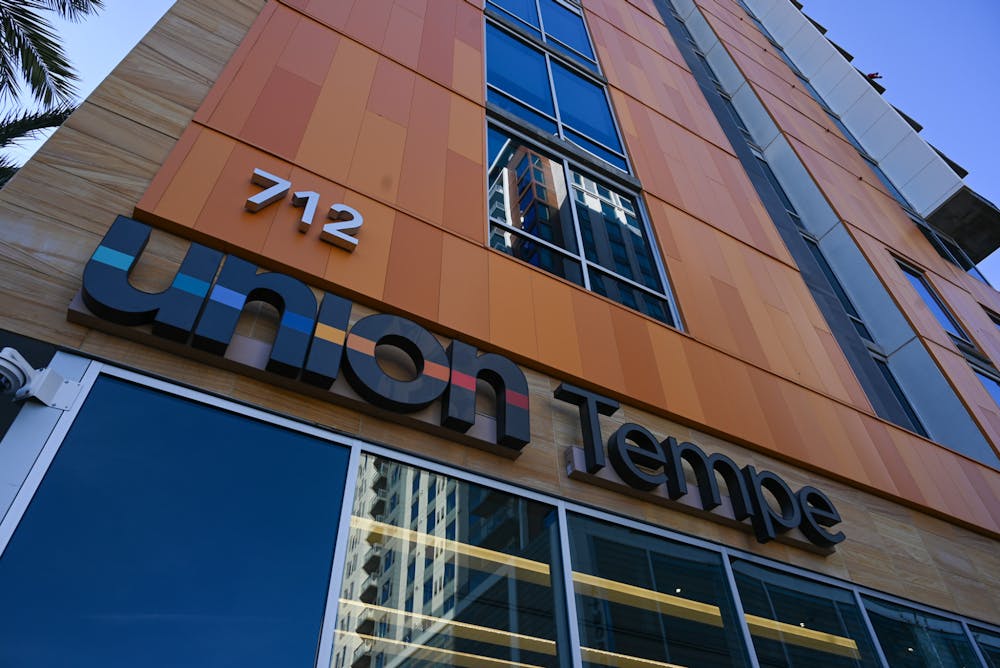Tempe Mayor Corey Woods expects the city to keep up with demand for affordable student housing near the University — student advocates aren’t so sure.
Woods referenced several policies and programs that could help students find housing, including relevant initiatives.
However, students campaigning for more accessible housing are finding it difficult to believe that Tempe and the University are doing enough to address the shortage near campus.
The mayor pointed to Question No. 3 from Tempe's special bond election in 2024, which authorized funding to increase the affordable housing supply. The question passed with 69.39% of the vote, according to Maricopa County officials.
Woods also said the city is working toward its goals via the Hometown for All program. According to the city of Tempe, it is an initiative meant to accelerate "the growth of affordable housing through a sustainable funding stream." Woods said the program has a voluntary donation system for developers to contribute to affordable projects.
The Hometown for All program requires the city to dedicate 50% of the permitting fees it receives from developers to a specific affordable housing fund, Woods said. That money cannot be used for anything else.
"Students and all populations in Tempe will be taken care of with the decisions that the City Council is making," Woods said.
However, the mayor’s plans face doubts within the University from students experiencing the scarcity of affordable housing firsthand.
Cameron Phipps and Angel Santos, two freshmen studying criminology and criminal justice, are part of a coalition tackling the lack of affordable housing for students. The group, involved with the LEAD program on campus, hopes to increase the supply of on-campus dormitory space and access to off-campus apartments.
Phipps and Santos both said more needs to be done to address the difficulties students face in finding a place to live after their first year. However, he said the priorities of the city aren’t lining up with the needs of the University.
"They’re building and building,” Santos said. “They’re just not building for the right people."
READ MORE: Tempe's transformation brings business growth, lacks ASU development
On the contrary, Woods said data collected by Tempe’s Housing Division showed a need for high-end and affordable development.
"It’s important to grow housing supply in all of those different categories," Woods said.
He highlighted redevelopment as a tool for the city to improve housing affordability and increase the number of available units. He said the City Council has authority over the permitting and re-zoning processes to prevent gentrification.
Still, the mayor said there are governmental boundaries that restrict the city's ability to improve residential living.
“There’s not always a ton you can do in certain situations," Woods said.
Private ownership and property sales can present a challenge to the city’s efforts to increase housing affordability.
“We’re still trying to find ways in the city of Tempe to do legal things to make sure that we are not a community of just the haves and have-nots,” Woods said.
Phipps and Santos both said the redevelopment of existing properties could be helpful but also poses risksto the history and beauty of the city.
Santos said the city should work to preserve historic buildings. Still, he believes redevelopment could help to meet the demand for residential space.
The student coalition Phipps and Santos are part of advocates for partnerships between apartment complexes and the University. They also support student rent vouchers that would reduce costs and a housing fund for lower-income students.
READ MORE: Prospective student renters change tune after new Arizona rental tax law
Phipps and Santos agreed that — while the University ought to do more to help students find off-campus housing — the issue extends beyond campus administration.
"It is bigger than just the University," Phipps said. "It is the city."
Even so, the students both said housing services at the University do not include adequate and easily accessible resources to help students find apartments off-campus. They said only a few in the student body know about the University website listing off-campus apartment complexes.
"ASU could definitely do a better job of putting that out there for students," Santos said.
Woods does acknowledge the struggles the city as a whole is facing in housing its residents, both now and in the future.
"We absolutely do not have housing to accommodate not only the estimated 72,000 plus people that are going to move here, but even people who want to live here now," he said.
Nonetheless, the mayor remains hopeful that Tempe is up to the task.
"I feel very confident that we’re going to be able to create the amount of housing needed," Woods said.
Edited by George Headley, Sophia Ramirez and Natalia Jarrett.
Reach the reporter at coyer1@asu.edu and follow @carstenoyer on X.
Like The State Press on Facebook and follow @statepress on X.
Carsten is a freshman studying journalism and mass communication. This is his first semester with The State Press. He also worked as his high school's newspaper editor-in-chief.




